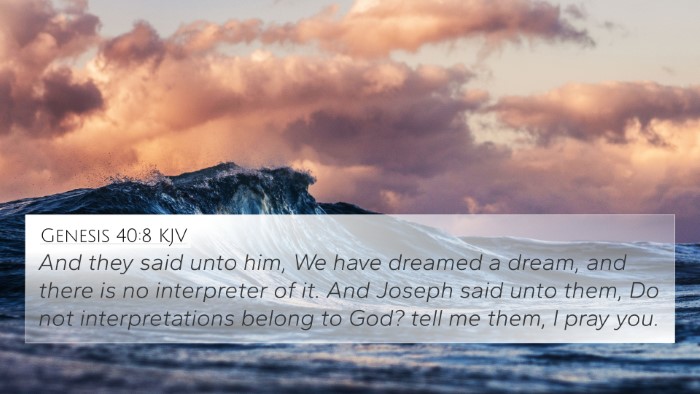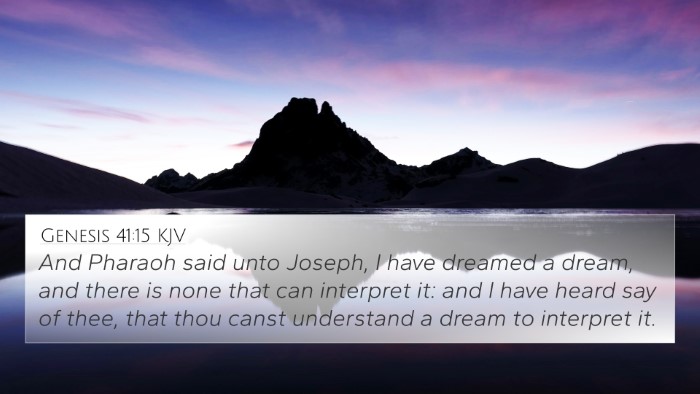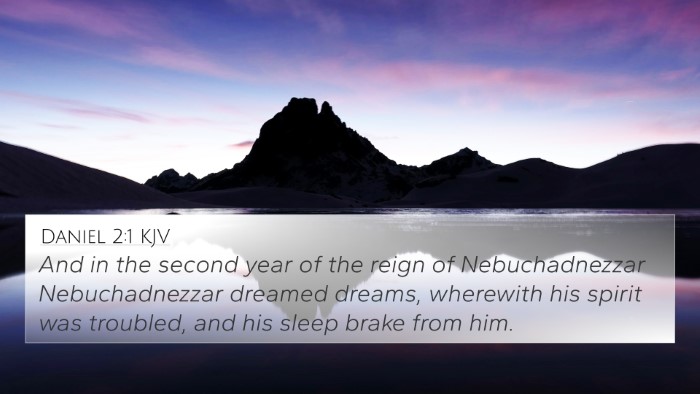Understanding Daniel 2:3
Daniel 2:3 states:
"And the king said unto them, I have dreamed a dream, and my spirit was troubled to know the dream."
This verse is a pivotal moment in the Book of Daniel, as it sets the stage for the unfolding of God's revelation through Daniel concerning the future of empires and the kingdom of God.
Verse Meaning and Context
In this passage, King Nebuchadnezzar is expressing his distress over a troubling dream that he cannot recall yet profoundly impacts his spirit. This moment is significant for several reasons:
- The Role of Dreams: Dreams in biblical times were often seen as vehicles for divine communication. The king’s trouble reflects the importance of this particular dream and the need for interpretation.
- Highlighting God's Sovereignty: By seeking the interpretation of his dream, Nebuchadnezzar unwittingly opens the door for God's revelation through Daniel, emphasizing that God is in control of all kingdoms and events.
- The King's Distress: The king’s agitation illustrates the emotional weight that divine messages held for leaders. His inability to remember the dream signifies a deeper spiritual struggle within him.
Commentary Insights
Building on the insights from various public domain commentaries:
-
Matthew Henry:
Henry emphasizes that God uses dreams as a means to communicate His purposes. The king’s confusion indicates a divine setup to demonstrate God's power through Daniel’s interpretation.
-
Albert Barnes:
Barnes notes that the dream was likely a reflection of God’s plan for the future, setting the context for the subsequent visions Daniel would later interpret.
-
Adam Clarke:
Clarke remarks on the psychological state of Nebuchadnezzar, highlighting the spiritual implications of leadership and the need for divine guidance in governance.
Cross-References for Daniel 2:3
This verse connects with various other biblical texts that highlight similar themes of divine revelation, dreams, and the sovereignty of God:
- Genesis 40:8: "And they said unto him, We have dreamed a dream..." - Reflects the importance of dreams and interpretations.
- Genesis 41:16: "Joseph answered Pharaoh, saying, It is not in me: God shall give Pharaoh an answer of peace." - The connection of God providing interpretation through His prophets.
- Job 33:14-15: "For God speaketh once, yea twice, yet man perceiveth it not." - Emphasizes divine communication through visions and dreams.
- Isaiah 44:25: "That frustrateth the tokens of the liars..." - God’s dominion over the wisdom of nations and kings.
- Matthew 1:20: "But while he thought on these things, behold, the angel of the Lord appeared unto him in a dream..." - God revealing plans through dreams in the New Testament.
- Acts 10:9-16: Peter’s vision serves as an example of divine revelation impacting early disciples.
- Revelation 1:1: "The revelation of Jesus Christ, which God gave unto him, to show unto his servants things which must shortly come to pass..." - Explores how God reveals future events through chosen individuals.
Thematic Connections
In studying Daniel 2:3, one can observe the following themes that recur throughout scripture:
- Divine Guidance: Both Old and New Testament leaders sought God’s guidance through dreams and visions.
- Importance of Interpretation: Understanding God’s will often requires the insight of those gifted in divinely inspired wisdom.
- Sovereignty of God: God's control over earthly kingdoms and the unfolding of history is a central theme in biblical literature.
- Emotional Impact of Revelation: The struggle of leaders under divine pressure illustrates the weight of responsibility and the need for divine intervention.
Application for Today
For modern readers and believers, Daniel 2:3 serves as a reminder of the importance of seeking God’s guidance, particularly during times of uncertainty. The king’s experience can encourage individuals to:
- Seek prayerful understanding: Just as Daniel sought understanding from God, believers today should earnestly seek God’s will in their lives.
- Understand the significance of dreams: While not all dreams carry prophetic weight, believers can reflect on their dreams for possible divine insights.
- Recognize the presence of spiritual conflict: Acknowledging the struggle between understanding God’s plans and human uncertainty is part of the believer's journey.
Conclusion
Daniel 2:3 presents an intense moment of spiritual and emotional significance, setting the groundwork for God's revelation in the glory of His plan for humanity. By exploring its meanings, connections, and interpretations through cross-referencing, we gain a richer understanding of how God interacts with His creation through the dreams and visions of His chosen vessels.
Engaging in Bible cross-reference studies can greatly enhance our knowledge and application of scriptural truths. Tools like a Bible concordance or Bible cross-reference guide can aid readers in identifying connections between Bible verses and understanding the thematic Bible verse connections throughout scripture.






